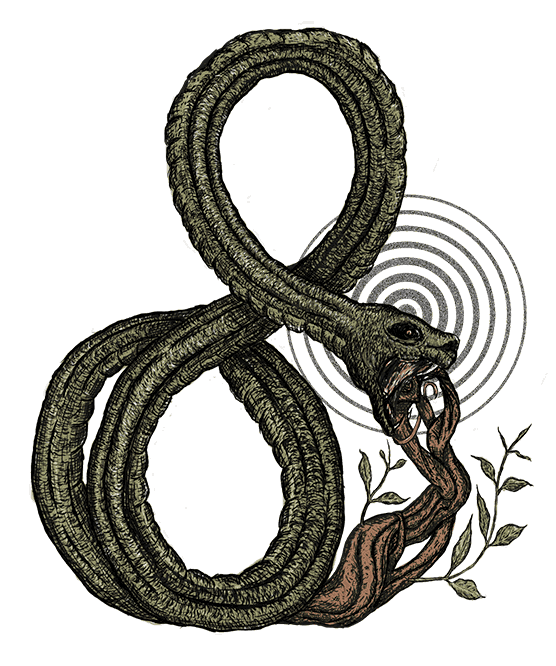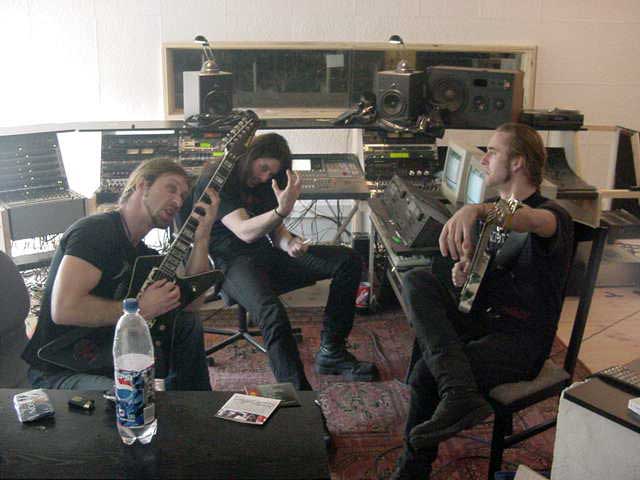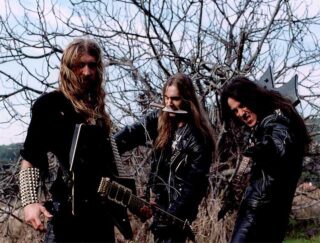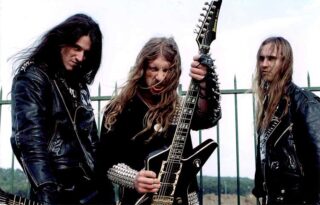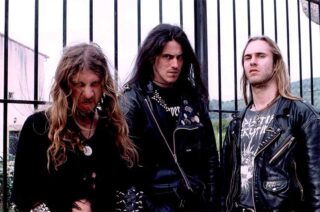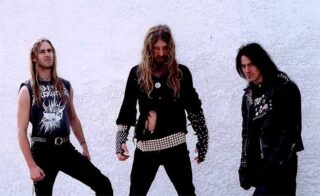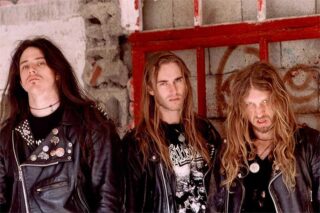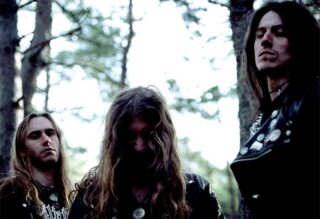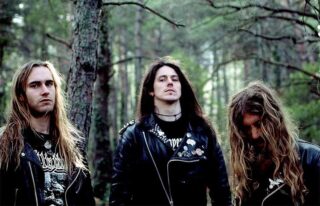Deströyer 666 V
2023-11-08
by Niklas Göransson
Come the year 2002, Deströyer 666 found themselves backed into a corner. With the band’s future in Europe on the line, they entered Sound Suite Studio in Marseille, France, to forge Cold Steel… for an Iron Age.

CHRIS MERSUS: The pressure was on, as the Aussies weren’t sure how long they could remain in Europe. My understanding was that we’d record the album, probably do a few more shows, and then the band would go back to Australia. That’s why I wanted to put as much passion and energy into “Cold Steel…” as possible.
KK WARSLUT: There was a sense of urgency in that we’d come all this way and sacrificed so much. If the fans hated our new album, we’d have no choice but to go home. Obviously, we weren’t gonna stay around and flog a dead horse; it either worked or it didn’t. We weren’t looking for mainstream success, nor were we about to tolerate living in poverty, banging our heads against the wall.
MERSUS: Three months before we went to the studio, only one or two songs were finished. Simon had this cool little Casio drum machine thingy; he’d tap out a beat, and they’d play some riffs over it. At least it gave me something to work with. We’d collected many different musical ideas but still came to the studio unprepared.
In January 2002, DESTRÖYER 666 arrived at Sound Suite Studio in Marseille, France, to record their fourth album, “Cold Steel… for an Iron Age”, with Norwegian producer Terje Refsnes.
IAN SHRAPNEL: Keith liked the sound on CARPATHIAN FOREST’s “Strange Old Brew”, and Michael Berberian from Season of Mist said, ‘I can get you that studio.’ We had to take the train there with all our fucking guitars and bags.
MICHAEL BERBERIAN: Going to Sound Suite was a smart move. Terje had recently relocated to France, but he was the go-to guy in Norway back then, handling everything from Napalm acts like TRISTANIA and THE SINS OF THY BELOVED to CARPATHIAN FOREST and GEHENNA. Terje was a good sound engineer – but more than that, he was a great producer in the sense that he could bring out the best in a band.
SIMON BERSERKER: Michael and Sabiene from Season of Mist picked us up from the train station. I remember Sabiene getting into it straight away: ‘Guys, we’ve been hearing bad things about you. The manager of CANNIBAL CORPSE complained about your behaviour and rah, rah, rah.’
BERBERIAN: Do I recall what it was about? No. But if someone could tell bands like MAYHEM and DESTRÖYER to cut the shit and behave back then, it would’ve been her. So, Sabiene saying it straight to their faces – about poor attitudes or whatever they did wrong – and them just looking down, taking it without complaint… yes, that sounds very likely.
WARSLUT: I don’t remember being scolded, but I do recall that Sabiene was stunningly beautiful – which immediately made me nervous. Whenever she came by the studio, I’d be lounging around on the couch. And then she’d walk through the door, and I’d immediately go… spine straight, chest out, trying to look the part <laughs>, and not like a fucking slob.
BERBERIAN: Sabiene is my ex-wife, so I’d never say anything bad about her. She’s the mother of my children, and we were together for twenty years. Keith and Sabiene always had huge mutual respect – perhaps even attraction for each other at some point – but she is also an iron lady who can lay down the law.
MERSUS: The studio had professional equipment, and the engineer understood that we wanted to record in a live environment, but the accommodation was like a prison. The circumstances were absolutely horrible. We slept in bunk beds, the hot water lasted for about five minutes, and all of us hated one another after an hour. A few days later, we’d stopped talking altogether.
BERSERKER: We lived in a little apartment equipped with a boring kitchen. We’d record for twelve hours, cook dinner, and then sit around arguing – and that was usually the highlight of our day. Or if Keith was like, ‘Alright, I’m gonna do these tracks today’, then Ian and I would go for a big wander and check out nearby villages. There were some nice areas around, but we just didn’t have any money.
MERSUS: Every day, there was a fight over the hot water – they were like little children. I remember Ian was always the first in, and Keith gave him shit about it. I didn’t even bother trying and just said, ‘Look, I’ll have a cold shower; I don’t fucking care.’
SHRAPNEL: We had no money for booze or weed – we didn’t really have anything. The studio was in the middle of nowhere, really isolated, and the surroundings were kind of cold and bleak. There wasn’t much around besides a supermarket a few kilometres away.
WARSLUT: It wasn’t even a nice walk, but along the side of a highway – just horrible. I remember one day… we were all getting a bit shitty after being stuck in the studio for a while. We’d been to the supermarket and were headed back, carrying big shopping bags. Simon was raging about something when he walked straight into one of those big, green highway signs <laughs>. Oh man, he was so fucking angry.
BERSERKER: We had a few issues in the studio, and tempers were flaring. Then, like, ‘Alright, we’re going to the shops to get some food!’ And while walking back, I was whinging and moaning about something: ‘Ah, bugger this – rah, rah, rah’, and then it was literally just… bang!
WARSLUT: Me and Ian fell back a couple of steps and looked at each other… we had to contain our amusement because Simon was fucking furious. And he’s always a real cool fella: Mr Relaxed himself, never got agitated. Well, apart from that time in Austria <laughs>. But now he’s just erupting: ‘FUCK! Fuck this place! Fuck this shit!’ Ian and I went completely silent; several hours passed before we could joke about it.
BERSERKER: They all thought it was hilarious, naturally, which just fired me up even more.
WARSLUT: It was brilliant because I had a perfect view of the collision. Ya gotta understand, Simon didn’t just bump into the sign – it kinda scraped all along the top of his skull. With the momentum of the hill, combined with the weight of the shopping bags, he must’ve had a good strut going and built up some serious fucking speed, mate, because that thing almost lopped his dome off. It was like watching a man being scalped. Still makes me laugh now, twenty years later.
SHRAPNEL: The studio was booked for a month, which is insane. It was a bit of a struggle at first; things weren’t going great. You know, people think of recording an album as, ‘Oh, that’s exciting!’ – but it can also be really stressful. You’re under a lot of pressure, ya gotta get shit down, and things weren’t running smoothly at all.
WARSLUT: One song in particular, “Cold Steel…”, had a tricky drum part in the beginning. We hadn’t rehearsed enough, it had an odd timing, and maybe we weren’t that on point, making Mersus’ job a lot harder. We ended up just dropping it. But to his credit, he pulled off the rest. No worries.
SHRAPNEL: Some of the material had been floating around in one shape or another for a while. “The Fall of Shadows” was the last DESTRÖYER track we wrote in Australia. Others were very recent; Keith actually came up with “Black City – Black Fire” at the studio. It’s a great song and just what the album needed. It was really punchy and worked well with the production.
MERSUS: One morning, I woke up early because I couldn’t sleep in my cold, uncomfortable bunk. I heard Keith playing guitar and went to investigate. He asked, ‘What do you think of this riff? Look at me, Chris; look at me! What do you think?’ I said, ‘Sounds great. But man, it’s 7 am – what the fuck are you doing?’ Then he goes, ‘Give me a beat on your legs! Exactly, just go straight like that all the time. Do you think we can record this?’ I said, ‘Yeah, for sure. Let’s do it.’
WARSLUT: That part we took out from the title track came back several times, so removing it shortened the song by half. Which, in retrospect, probably wasn’t a bad thing. But now we needed an extra track, and I had a riff that I started working on. Then Simon came up with a little bridge, and that turned into “Black City…”.
MERSUS: It was one of the most spontaneous songwriting sessions of my life – highly indicative of the shared creativity we had back then. Everything just clicked. Let’s say the right amount of inspiration from all the different guys converged at the perfect time. “Cold Steel…” really brought it out of us.
“Cold Steel…” saw DESTRÖYER 666 take a more stripped-down approach and reintroduce many of the thrashier elements of the first era. A logical move for a band intent on growing its profile would’ve been to expand on epic “Phoenix Rising” compositions like “I am the Wargod” and “Lone Wolf Winter”, which still to this day appear to be among their most popular songs.
BERBERIAN: Sure, it would’ve made “Cold Steel…” more successful in a commercial sense. But then again, that’s just not them. Whatever achievements DESTRÖYER 666 have had over the years is because they always remained true to themselves. People know and respect this attitude. Besides, nobody wants DESTRÖYER 666 to sound like AMON AMARTH.
Were you surprised when you first heard it?
BERBERIAN: No, because I’d gotten to know the guys by then – and somehow, in real life, “Cold Steel…” is precisely what they were like. It’s a gritty street-fight, while “Phoenix Rising” is rather epic and majestic. DESTRÖYER are more barroom brawl type of boys.
SHRAPNEL: We felt that “Phoenix…” was a bit polished in some ways – not so much the songs, but the production itself. We wanted “Cold Steel…” to sound edgier and more bitey. I think that’s why the album came out the way it did, but I’m not sure whether this was a conscious decision.
BERSERKER: I wrote one song in its entirety and contributed to a few others. Ironically, I was always fonder of DESTRÖYER’s epic side – like “Genesis to Genocide” and “I am the Wargod” – than the other stuff. Some songs have epic parts, but all in all, “Cold Steel…” is a time capsule of what we were like then: hungry and dead-set on making a lasting impression. The music encapsulates our mood and zeitgeist, and it’s very honest and raw. We were furious and determined at the same time. Because for us, it really was all or nothing.
The razor-sharp riffs showcase the best aspects of DESTRÖYER’s thrashier side, but the grandiose atmosphere of the preceding offerings is largely gone. Same with the abundance of opera-length solos and leads. Furthermore, the intricate bass-playing gives way to basslines that mostly follow the guitars – which made me curious if this development was in any way related to the absence of Bullet Eater.
WARSLUT: Oh, absolutely. Phil (Bullet Eater) was a seasoned bass player with twenty years of experience; Simon was a guitarist who picked up the bass just to join DESTRÖYER. So, of course he’s not gonna have Phil’s licks and experience.
SHRAPNEL: Phil has a good grip on music and came up with a lot of killer ideas. He also had a big presence on bass and an overall great feel for that instrument. I think Simon would probably describe himself as a guitarist as opposed to a bass player.
BERSERKER: Keith and Ian wanted it that way. I was really into nice basslines à la Timi Hansen (MERCYFUL FATE, KING DIAMOND) – not that I could play like that, but I liked it. I thought the bass should always be doing its own thing. I’d do little scale runs wherever I could, but generally, if I did something that KK and Ian thought was too intricate, they’d be like, ‘Nah, just stick to the meat and potatoes.’ Which is fine; I think that lends itself more to the “Cold Steel…” style anyway. If it had more of the epic, open, and sprawling stuff, I would’ve gone a bit crazy with it, for sure.
MERSUS: The funniest part was when I’d travelled back to Germany and Michael from Season of Mist came in with a photographer. I was meant to return for the mixing session and do some backup vocals, but they decided to do the photo session without me. I said, ‘Well, it’s a little weird what you’re doing here, but okay.’ I guess that was telling about the studio atmosphere. Just by listening to “Cold Steel…”, you can hear all the anger and frustration.
Photo: Michael Berberian senior
There is a tangible sense of fire in “Phoenix Rising”, whereas “Cold Steel…” has more of a gloomy and almost bleak feel to it. Furthermore, the lyrics have a radically different tone.
MERSUS: I think Keith was processing everything he’d gone through since leaving Australia. There was a lot of reflection leading up to “Cold Steel…” – that recording is a very personal timestamp for him. But there were never any objections from the rest of us; we had some discussions about the lyrics, and Keith captured the essence of it. We just said, ‘This is perfect.’
WARSLUT: I suppose that since moving to Europe, I’d lost many of the romantic notions I had about life. Add to that the burden of leaving everything behind in Oz. I mean, Shrapnel and I were both in long-term relationships. So yeah, there was some baggage there, for sure.
Another factor was living in Holland. In Bardo Methodology #1, KK spoke about how the country drained him of creativity. Besides a populace with very different character traits and temperament than Australians, he was bothered by the lack of wilderness. Every piece of land seemed to be segmented and fenced off for some manner of commercial purpose.
WARSLUT: Holland is a very utilitarian society and landscape. There’s a reason why it’s one of the most productive farmlands and animal husbandry grounds in Europe – the world, even. They’re efficient and pragmatic, which doesn’t necessarily lend itself to certain inclinations. In fact, it tends to make you more… I don’t know if ‘nihilistic’ is the right word. Well, yeah, nihilism as a result of pragmatism: the romance taken out of life. I’d say the spirit, almost.
BERSERKER: Darragh said something similar at the time; ‘It’s really nihilistic.’ I think it goes back to what I was saying about “Cold Steel…” being a symptom of the times. We had to prove that we were the real deal. So, I think it was a bit, ‘This is who we are – go fuck yourselves.’ Pretty punk, in an almost EXPLOITED-like fashion. I think it came across, and the people who were attracted to that kind of music understood this clearly. And they liked it.
The song “Raped” is banned from Spotify – presumably due to the lyrics. Furthermore, it’s been referred to as proof of KK’s alleged disdain for the fairer sex.
WARSLUT: I’ve already addressed this in the 2012 re-issue. I’d read that a large percentage of women – I can’t remember the exact figure – had rape fantasies, which I found baffling. I’ve since come to understand it better, but at the time, I found this perplexing. So, I wanted to tackle the issue by using it as a lyrical theme. Now, I’m a normal human being in many respects and find rape utterly disgusting. I think it should be punished far more harshly than it currently is. And towards the end of the song, I briefly summarise my thoughts.
So why does this tale turn you on?
Why does it excite you?
Cos we are beasts like the beasts in the wild?
But more like farmyard pigs
Why was the song “Dragon” – which is included in the aforementioned re-issue – left out?
BERSERKER: We thought it sounded a bit sloppy. I believe that was the reason – because I remember being quite fond of “Dragon”. Truth be told, you can hear some stuff on “Cold Steel…” that isn’t extremely tight. But that doesn’t matter, as long as the attitude is there.
WARSLUT: The studio guy had just moved from Norway to the outskirts of Marseille. He was having an ongoing fuckin’ constant argument with his missus, which would sometimes entail him disappearing for hours. We were leaving at 7 am on the final day… but because of this bullshit, we had to work until six o’clock in the morning. That’s how out of time we were – even with a whole fucking month to record a thrash album.
The recording was finished on the morning of February 6, 2002. Two and a half weeks later, DESTRÖYER 666 made their US debut with gigs in New York and New Jersey.
BERSERKER: It was pretty soon after 9/11, so we figured they’d be checking everyone. We didn’t bring any instruments; our main concern was smuggling in bags of merch. Arriving at customs, we were really nervous. But the immigration officer Ian ended up with just went, ‘That’s cool, man. Welcome!’ and the chick in my booth happily stamped me through with all our smuggled goods and shit.
SHRAPNEL: The New Jersey show was pretty small; I think that one was with NUNSLAUGHTER. One of the bands threw out dead rodents from stage…like, ‘What the fuck?’ Kind of weird. The New York show was at L’Amour – the famous venue. Simon and I were going, ‘Fuck, MANOWAR played here!’ I remember sitting in the backstage room thinking, ‘Wow, there’s some real metal history here.’
MERSUS: Fuck, when I heard we were playing that venue… ‘What the hell? This is absolutely killer.’ All the great bands started off there, right? I mean, METALLICA’s first East Coast gigs took place at L’Amour, SLAYER played there – you name it. It’s even part of the lyrics of a TYPE O NEGATIVE song. We went to what they called the ‘small stage’ but were told, ‘Guys, this is not for you. You’re on the big stage tonight.’ I was stunned.
log in to keep reading
The second half of this article is reserved for subscribers of the Bardo Methodology online archive. To keep reading, sign up or log in below.
